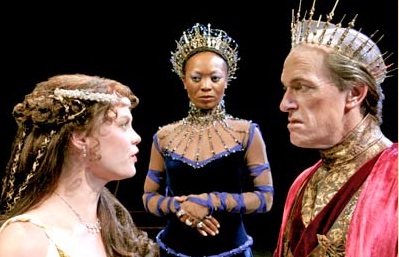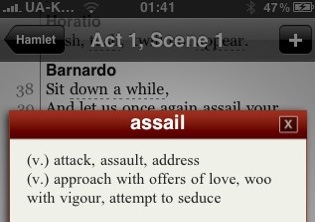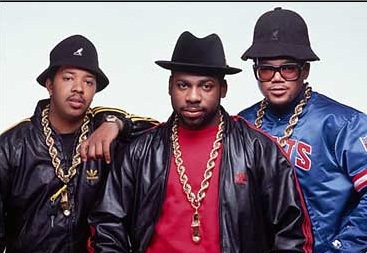In Shakespeare’s time, people did not go to “see” a play; they went to “hear” a play. Which Shakespeare play would you like to hear?
A few months ago, I wrote a post about my Shakespeare addiction that referenced the Caedmon audio production of As You Like It. Regular readers of the blog know well the extent of this addiction, but what they may not know is the degree to which that addiction includes audio productions of Shakespeare. Most people organize their mp3 playlists with different genres of music plus one “Spoken Word” category. My iPhone has a “Music” playlist, with various Spoken Word sub-genres, including several playlists of performances of Shakespeare. Given the hours upon hours I have spent listening to these productions, I am now pleased to share with you my ten very favorite selections.
Now, if this is your thing, you really need to get The Complete Arkangel Shakespeare . This is a breathtaking collection of top-quality productions of each of Shakespeare’s plays, directed by Clive Brill and with original music by Dominique Le Gendre. The advantage of buying the set is that you will then have the option to listen to any title you choose. But if you’re not ready to make that kind of investment into the eclectic world of Shakespeare audio, I can give you my own top picks so you can get your feet wet before diving into the deep end of the pool.
. This is a breathtaking collection of top-quality productions of each of Shakespeare’s plays, directed by Clive Brill and with original music by Dominique Le Gendre. The advantage of buying the set is that you will then have the option to listen to any title you choose. But if you’re not ready to make that kind of investment into the eclectic world of Shakespeare audio, I can give you my own top picks so you can get your feet wet before diving into the deep end of the pool.
Standard disclaimers apply. These are based on my own preferences, which are always subject to change. I based my rankings on writing, acting, directing, production, and music. I limited myself to modern productions only, so you won’t find Paul Robeson or Orson Welles on the list. And I’m sure there are many excellent productions I haven’t listened to. Basically, these are the ten audio productions of Shakespeare I find myself returning to again and again.
And, in keeping with tradition, my top ten list will have twenty entries. Enjoy!
1. King Lear (BBC)
Directed by Glyn Dearman; Starring Sir John Gielgud (Lear), Kenneth Branagh (Edmund), Emma Thompson (Cordelia), Derek Jacobi (France), Bob Hoskins (Oswald), Judi Dench (Goneril), Michael Williams (Fool), and Richard Briers (Gloucester).
This, to me, is the definitive audio Lear. Gielgud takes a larger-than-life character and truly brings out his humanity. An all-star cast delivers solid performances across the ensemble. This is Shakespeare the way it was meant to be performed.
2. As You Like It (Caedmon)
Vanessa Redgrave as Rosalind gives one of the greatest audio performances I’ve ever heard. If you’re a fan of the play, or even if you’re not, you owe it to yourself to hear this amazing production.
3. Richard III (Cambridge)
Starring Kenneth Branagh (Richard III), Celia Imrie (Queen Elizabeth), Bruce Alexander (Edward IV), Michael Maloney (Clarence), John Shrapnel (Hastings), Stella Gonet (Anne), Jamie Glover (Richmond), and Nicholas Farrell (Buckingham).
I wouldn’t really have thought of Branagh for the hunchbacked villain, but he does a great job leading a top-notch cast in performing Shakespeare’s classic history play. I never really knew how much was going on in this play until I heard this production.
4. Julius Caesar (Arkangel)
Starring Michael Feast (Julius Caesar), John Bowe (Brutus), Adrian Lester (Mark Antony), Geoffrey Whitehead (Cassius), Estelle Kohler (Portia), and Jonathan Tayler (Octavius).
I can listen to this one again and again. The exchanges between Bowe’s Brutus and Whitehead’s Cassius are electric, and Marc Antony’s powerful monologues are explosive in Lester’s more-than-capable hands.
5. The Comedy of Errors (Arkangel)
Starring David Tennant (Antipholus of Syracuse), Brendan Coyle (Antipholus of Ephesus), Alan Cox (Dromio of Syracuse), Jason O’Mara (Dromio of Ephesus), Niamh Cusack (Adriana), Sorcha Cusack (Luciana), and Trevor Peacock (Egeon).
Along his path to directing the canon, Clive Brill has a lot of fun with Shakespeare’s only slapstick comedy. Silly sound effects and comical music underscore fantastic comic performances by a brilliant cast. Remember, dying is easy; Comedy‘s hard.
6. King John (Arkangel)
Starring Michael Feast (King John), Eileen Atkins (Constance), Michael Maloney (Bastard), Geoffrey Whitehead (Phillip), Trevor Peacock (Hubert), Bill Nighy (Pandulph), and Margaret Robertson (Elinor).
Michael Maloney steals this particular show, as the Bastard often does in King John. But strong performances across the cast have the power to churn the blood and tug a few heartstrings as well.
7. Macbeth (Caedmon)
There are a number of audio Macbeths to choose from, but I give Anthony Quayle pride of place. Mood-enhancing sound effects and strong performances across the board make this production the Macbeth of choice.
8. Othello (Cambridge)
Starring Hugh Quarshie (Othello), Anton Lesser (Iago), Emma Fielding (Desdemona).
Lesser’s edgy voice creates a dangerous Iago, who provokes a genuine sense of menace. Quarshie’s passionate Othello makes for a worthy tragic figure. Together, the two performances leave us with an unforgettable audio experience.
9. Henry V (Cambridge)
Directed by David Timson; Starring Samuel West as Henry V.
This is a stirring and creative production of Henry V. Vibrant interpretations of even the minor characters make for a consistently interesting and entertaining presentation of the well-beloved history.
10. As You Like It (Arkangel)
Starring Niamh Cusak (Rosalind), Stephen Mangan (Orlando), Gerard Murphy (Jaques), Clarence Smith (Touchstone), and Victoria Hamilton (Celia).
This is a really great audio production of the play. I rated the other version much higher, but I actually prefer Dominique Le Gendre’s music in this one. And for As You Like It, the music is no insignificant character.
11. Measure for Measure (Arkangel)
Starring Roger Allan (Duke), Simon Russell Beale (Angelo), Stella Gonet (Isabella), Jonathan Firth (Claudio), and Stephen Mangan (Lucio).
Here’s another one I keep revisiting. Beale and Gonet create sparks as Angelo and Isabella, Mangan is brilliant as Lucio, and Allan’s Duke never lets you forget who’s in charge. I think I want to go listen to this one right now.
12. King Lear (Naxos)
Starring Paul Scofield (Lear), Alec McCowen (Gloucester), Kenneth Branagh (Fool), David Burke (Kent), Harriet Walter (Goneril), Emilia Fox (Cordelia), Sara Kestelman (Regan), Richard McCabe (Edgar), and Toby Stephens (Edmund).
Okay, so Paul Scofield as Lear should be enough, right? But he is supported by a great ensemble cast in a well-directed version of one of the greatest plays ever written. Check it out!
13. The Tempest (Naxos)
Starring Ian McKellen (Prospero), Scott Handy (Ariel), Emilia Fox (Miranda), Neville Jason (Antonio), Benedict Cumberbatch (Ferdinand), and Ben Onwukwe (Caliban).
Okay, so Ian McKellen as Prospero should be enough, right? But this is another high-quality Naxos masterpiece – a must-have for Shakespeare audio collectors.
14. Henry IV, Part One (Arkangel)
Starring Jamie Glover (Hal), Julian Glover (Henry IV), Alan Cox (Hotspur), and Richard Griffiths (Falstaff).
I really love this play, and the Arkangel production does it great justice. Griffiths creates a Falstaff with his voice that has the power to rival his stage counterparts. Each scene in this production is like a little gift-wrapped present.
15. Hamlet (Cambridge)
Anton Lesser is the man! This time, he lends his distinctive voice to the Melancholy Dane, striking just the right balance between contemplative and bitter, between witty and mad. There are certainly other audio Hamlets, but Lesser is greater!
16. A Midsummer Night’s Dream (Naxos)
Starring Warren Mitchell (Bottom), Michael Maloney (Oberon), Sarah Woodward (Titania), Jack Ellis (Theseus), Benjamin Soames (Lysander), Jamie Glover (Demetrius), Cathy Sara (Hermia), Emily Raymond (Helena), and Ian Hughes (Puck).
Again, I have several versions of the Dream to choose from, but I think I’ll take Naxos for the win. I’ve heard these words so many times, it’s an impressive production that can still make me laugh at them.
17. Richard II (Arkangel)
Starring Rupert Graves (Richard II), Julian Glover (Bolingbroke), and John Wood (John of Gaunt).
Let’s talk of Graves. (See what I did there?) He gives an outstanding performance as Richard, which is important, because – let’s face it – he does tend to go on a little.
18. Henry VI, Part Three (Arkangel)
Starring David Tennant (Henry VI), Kelly Hunter (Margaret), Clive Merrison (York), Stephen Boxer (Edward), John Bowe (Warwick), and David Troughton (Richard).
This is the beauty of the Arkangel series. You can listen to any play, any act, any scene you like. And sometimes, you just really need to hear the “paper crown” scene. When that day comes for you, this is the recording you’ll want to have.
19. Romeo and Juliet (Arkangel)
Starring Joseph Fiennes (Romeo), Maria Miles (Juliet), and Elizabeth Spriggs (Nurse).
Dominique Le Gendre’s love theme for this production becomes the theme song for the entire Arkangel series. Fiennes and Miles are wonderful, as you knew they would be. When you want to hear this play, hear this version.
20. Twelfth Night (Cambridge)
Starring Stella Gonet (Viola), Jonathan Keeble (Orsino), Jane Whittenshaw (Maria), Malcolm Sinclair (Andrew), David Timson (Feste), Lucy Whybrow (Olivia), Christopher Godwin (Malvolio), and Gerard Murphy (Toby).
Well, what can I say, this is my twentieth favorite. But it’s the best of all of the Twelfth Night productions I own, and it’s a great presentation of a fun play, so why not give it a listen?







